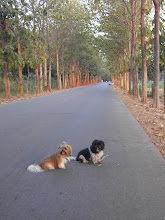“Songkran” is the Thai traditional New Year
and an occasion for family reunion. It starts April 13 and lasts between 3 and 10 days, depending on where you are in Thailand.
 It is the great opportunity for merit-making and a special time for Thai people to have fun,traditional music, dance, games, and other activities in the pastime. Thai people celebrate this festival with water. Everyone gets soaking wet and since it is the hottest season of the year, the custom is quite refreshing. Songkran is a Public Spring Cleaning Day, supported by the religious belief that anything old and useless must be thrown away or it will bring bad luck to the owner.
It is the great opportunity for merit-making and a special time for Thai people to have fun,traditional music, dance, games, and other activities in the pastime. Thai people celebrate this festival with water. Everyone gets soaking wet and since it is the hottest season of the year, the custom is quite refreshing. Songkran is a Public Spring Cleaning Day, supported by the religious belief that anything old and useless must be thrown away or it will bring bad luck to the owner.
 Activities in Songkran
Activities in Songkran
In the morning, people go to the temple to make merits by offering food to monks and novices, observing the precepts, Five or Eight precepts and listening to the Dhamma talk. During the afternoon of the 13th, Buddha images are bathed as part of the ceremony. Young people pour scented water into the hands of elders and parents as a mark of respect while seeking the blessing of the older people. In ancient days, old people were actually given a bath and clothed in new apparel presented by the young folks as a token of respect for the New Year.
After Buddha image and the monks bathing ceremony and asking blessing from elders, young people splash each other playfully. The waters that bring to splash have to be clean water and mixed with the aroma Ngmab. The place in playing splash is temple or square of the village mostly.

As part of the water sprinkling, water splashing and string tying rites, you may also encounter a person with a small silver bowl filled with a white powder or pasty substance. This is one of the oldest Songkran traditions. The white paste is a sign of protection and promises to ward off evil. The person with the paste is often older and he or she applies the paste to various parts of the face, neck and torso of others. One is expected to leave this paste on until it washes off of its own accord, and while there is a tendency to shy away from this paste because it looks like it might ruin the clothes, it is water soluble and will not harm materials.

There are other rituals and merit-making rites that people engage in at Songkran. In addition to the traditional cleaning of the home and bidding the old year adieu, these include making offerings to local temples and the monks. The offerings include preserved foods cooked dishes, fresh fruit and new robes for the monks. Also people build sand piles on the temple grounds and these sand piles represent personal pagodas built as part of the merit-making ritual.
The importance of Songkran Festival
1. It is annual holiday in Thailand and this has been a perfect time
to take break from the business of earning a living.
2. It is merit-making day and dedicated charity to the deceased relatives.
3. It’s a day to show gratitude parents and asking the blessing from the elders.
And Songkran Day is the day of the National Seniors.
4. It’s a family day. When Songkran arrived, all relative come to
participate philanthropy and create charity.
5. It’s conservation of Thai culture and tradition.
References:
http://gotoknow.org/file/su1958/141949795.jpg
http://agschool.rta.mi.th/images/stories/thai/sonkarn/sk1.jpg
http://www.voyagetravelmag.com/database/upload_files/photo_contest/aor.JPG
http://show.kapook.com/files/photo/07-09/24/medium_kapook-1248447492.jpg
By : Pattiporn Yoonui
Thanyaporn Sriseem
Khonkaen University, Thailand

No comments:
Post a Comment